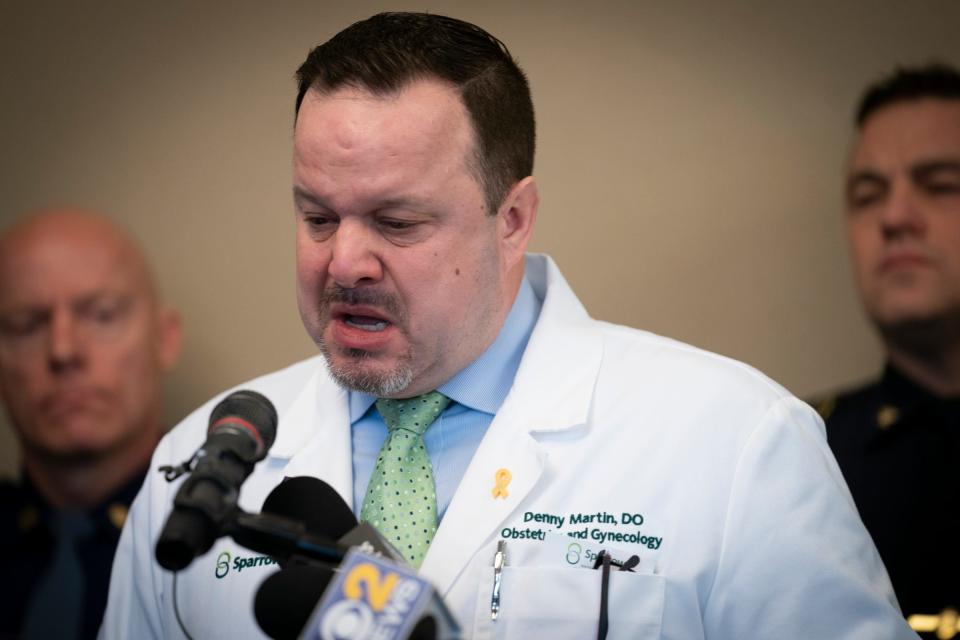Opinion: Inside Sparrow Hospital's trauma center after MSU shooting
The trauma team kicked into action the moment E.W. Sparrow Hospital’s police scanner reported an active shooter at Michigan State University on the night of Feb. 13.
As ambulances rushed to the still unfolding scene in Lansing, at least 100 caregivers and staff — including neurosurgeons, orthopedic surgeons, cardiothoracic surgeons, trauma surgeons, radiologists, anesthesiologists, surgical technicians, nurses and many others — were told to report as operating rooms, equipment, medicines and other resources were prepared, as coordinators communicated with the school to assess the scale of the carnage.
Within 17 minutes of confirming the massacre, the hospital received the first of five critically injured victims. Although Sparrow’s Level I trauma center serves thousands of patients each year, such mass causalities are relatively rare. But Dr. Denny Martin, Sparrow’s acting president and chief medical officer, said that, like actors on a stage, they were prepared through constant rehearsals.
“To establish order in what could be a chaotic situation we use scripts — algorithmic scripts — developed during scheduled simulations that identify who should talk and even where people should stand,” he said.
On Feb. 13, he explained, each of the five victims was assigned a team, whose leader led the initial examination of injuries to determine what care was required, so that everybody wasn’t talking at once. Detailed checklists of questions created in advance were used to make sure no detail was overlooked. Dr. Martin said that all five patients suffered life-threatening injuries that required the use of five operating rooms and a full complement of thoracic, trauma, neuro and general surgeons.
Even as trauma teams attended to the MSU victims, other gravely injured individuals arrived for care — including car accidents victims and someone who suffered a heart attack. The medical staff worked through the night to help preserve patient lives and, we hope, set them on the path to recovery.
Opinion: I teach in Berkey Hall. Healing hasn't started yet for me.
More: Face of Michigan State shooting response talks officers who wouldn't leave, misinformation
I wanted to write about Sparrow because their heroic efforts that night illuminate a crucial part of our health care system that is often overlooked. At a time when mass casualty events are far too common in the United States, the work of Level I trauma centers is crucial. Sparrow Health System, which will join the system I run, Michigan Medicine, next month, has one of 10 Level I centers in our state. The goal of this network is to provide coverage so that patients who suffer unimaginable injuries can get the full-range of care they require from the start.
We live in a time when criticism — in the media, online and in person — seems to be the coin of the realm and health care is no exception. I won’t repeat the litany of complaints that batter health care providers and systems daily. I don’t need to — you hear them every day.
So let’s take a moment to appreciate the miraculous care physicians, nurses and staff routinely provide, and to recognize that this care requires people and planning — whether in an ambulatory clinic or with mass trauma — that is expensive, both financially and emotionally.
My colleagues at Sparrow saved lives last week, just as they and health care providers do across the nation every day.
The preparation, facilities and people required to do so is expensive. For example, Sparrow spends $22 million a year to maintain its Level I trauma center which provides 24-hour in-house coverage by trauma surgeons and anesthesiologists and prompt availability of care in specialties such as orthopedic surgery, neurosurgery, emergency medicine, radiology, internal medicine, plastic surgery, oral and maxillofacial, pediatric and critical care. This means, for example, that large numbers of physicians and caregivers — such as those who responded on Feb. 13 — are on call 24 hours a day, 365-days a year.
I also wanted to write about Sparrow’s heroic efforts after watching Dr. Martin break down in tears while briefing the public on victims the morning after the shooting. Caregivers must display grace under pressure when confronted with unspeakable tragedy. But they are also deeply empathetic human beings who are moved by suffering — it’s one of the main reason they entered the field of medicine. While they must try to suppress their emotions in the moment, they are profoundly affected.

Like so many caregivers I know, Dr. Martin noted that while the shooting at Michigan State received wide attention, he and his colleagues witness heart-breaking situations on a daily basis, including victims of child abuse and rape. This work takes a toll, as evidenced by the troublingly high levels of burnout suffered by physicians and nurses. Although many organizations have recognized this problem and are putting programs in place to address it, medicine will always be trying.
We, as a culture, tend to take this for granted. The actions taken by scores of E.W. Sparrow Hospital caregivers and staff to care for the shooting victims was not just a triumph of modern medicine but of the human spirit, which demonstrated its best qualities under the worst circumstances.
We are fortunate to have today’s miracles in medicine. On Aug. 1, 1966, my father, brother and I strolled a block away from where 18 died and 31 were wounded, never realizing that the sounds we heard were rifle fire from the top of the University of Texas Tower. No trauma centers existed then. No care like what was provided at Sparrow last week.
Marschall S. Runge is executive vice president for medical affairs and dean of the Medical School for the University of Michigan. He serves on the board of directors for Eli Lilly and Company.
This article originally appeared on Detroit Free Press: Opinion: Inside Sparrow Hospital's trauma center after MSU shooting

